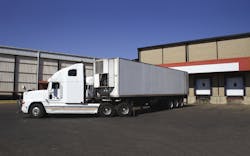New food safety rules pose impact for refrigerated carriers
Refrigerated carriers face a bevy of new mandates governing not only the condition and operation of equipment used transport foodstuffs but the capture and preservation of shipment temperatures, along with driver training requirements, due to go into effect March 31.
The new rules devolve from the Food Safety Modernization Act (FSMA) passed by Congress and signed into law by President Obama back in 2011, noted Don Durm, director of strategic customer solutions for PLM Trailer Leasing, during a panel discussion at the 2016 Truckload Carriers Association (TCA) meeting last week in Las Vegas.
“It really should be called the ‘Food Safety Documentation Act’ because there is nothing really new in it in terms of ‘modernization,’” Drum said. “But what it does is involve the FDA [the U.S. Food and Drug Administration] in the food supply chain as an enforcement agency. So why you need to pay attention to this [FSMA] is due to two words: criminal prosecution.”
He noted that while shippers and receivers are the main targets of the FSMA, refrigerated carriers become involved as the new rules require detailed temperature data to be collected and maintained, while imposing equipment and driving requirements as well.
Drum noted that refrigerated carriers are affected in three broad areas: They would be required to develop and implement written procedures – subject to record keeping, probably for a 12 month time period – that describes how they provide temperature data; their practices for cleaning, sanitizing, and inspecting vehicles and transportation equipment; and establish requirements for the training of carrier personnel engaged in transportation operations, including a requirement for records that document the training.
He added that while the FDA “won’t tell shippers and carriers how to deliver foodstuffs” it will be in charge of establishing the framework for what’s required to deliver such goods and enforce those requirements.
“The FDA now becomes an integrated part of the supply chain,” Drum said. “Rather than standing apart, they will become an enforcement agency – and one of their tools will be criminal prosecution. This will be about documentation, verification, and enforcement and they [FDA] will not be reactive; they will be proactive.”
As an interesting side note, one of the key architects of the FDA’s more “proactive stance” on food safety – Deputy Commissioner for Foods and Veterinary Medicine Michael Taylor – plans to step down June 1 this year right after the new rules are announced.
“He departs just before all of these rules are enforceable,” noted Durm. “So it is interesting that all of the folks that really pushed this [rule] to realization are now leaving when it has to be enforced.”
Regardless of that FDA personnel change, Durm maintained that refrigerated fleets will feel specific impacts in several key areas of their operations:
- It will affect trailer designs, depending on shipper requirements resulting from the new rules;
- It will tighten sanitary cleaning requirements of said trailers;
- There will be a “pre-cool” requirement for many shipments;
- Temperature tracking will be mandated;
- Data exchange and retention will be mandated;
- Driver food safety training will be required and a record of that training must be kept on file for access upon request.
“This is all part of a switch from the FDA reporting food contamination to taking an active role in preventing it,” Durm stressed.
As a result, R. Fenton May, chairman of telematics provider CarrierWeb – who co-presented with PLM’s Durm – urged refrigerated carriers to be proactive with their customers about the impending rules.
“Shippers must specify specific requirements to protect food in transit, and if you the carrier leave a vacuum the shipper will write their own rules,” he stressed. “Especially when it comes to the pre-cooling temperature requirement, you will have to exchange data; you must make that data available to the shipper and in a variety of formats. This is about ‘real-time’ food safety now.”
May said refrigerated carriers should expect about a one-year compliance window with the impending rules. “So far the FSMA rulemaking is on-time for March 31, and following a 60-day review period, enforcement should begin March 31, 2017.”
That’s why PLM’s Durm and May emphasized that refrigerated carriers should begin talking to shippers now about all the requirements that will be involved with the new rules.
“Some agencies will embrace enforcement big time; there’s definitely going to be a new sheriff in town,” Durm stressed. “Data exchange in multiple formats in real-time to meet shipper requirements is going to be difficult enough. And then there is the issue of where to store that data for easy retrieval; you need to think about it the ways you would a tax audit.”
Complicating things further is that while the FDA mandates driver training regarding food safety, no such training guidelines have yet been released. "The FDA currently envisions a 4-hour online course, but no training guidance has been issued at this time," Durm pointed out.
He added that another wrinkle is that insurance companies may require more details regarding food safety protocols as a result of al lof this, potentially increasing premiums for carriers that don’t demonstrate robust enough data collection, storage, and retrieval capabilities.
“For those carriers that self-insure themselves, maybe more money will need to be set aside,” he said. “And remember: food brought from outside the U.S. into the country must comply with the new rules; even if the food is produced outside the U.S. You have a year to get prepared.”
About the Author
Sean Kilcarr
Editor in Chief
Sean Kilcarr is a former longtime FleetOwner senior editor who wrote for the publication from 2000 to 2018. He served as editor-in-chief from 2017 to 2018.

